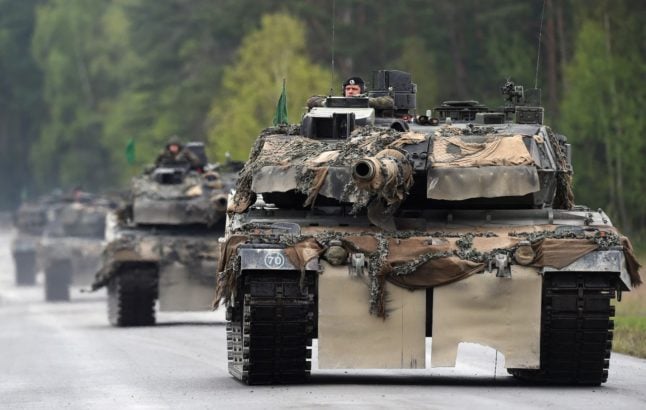INTERVIEW: Germany must ‘show leadership and vision’ for Ukraine
One year of Russia’s war against Ukraine has seen Germany upend decades of military restraint and a soft approach to the former Soviet power. Foreign policy experts say the German public has risen to the challenge. The country’s politicians though, get more mixed reviews.
Has the country had a ‘Zeitenwende’ or ‘sea change’ in how it thinks about foreign policy and security in Europe?
“Yes and no – or as we say in German – Jein,” Jessica Berlin, a German-American security analyst, told the The Local’s Germany in Focus podcast. “In the past year, Germany has broken with numerous taboos.”
“The Zeitenwende is here. It’s just unevenly distributed,” says Benjamin Tallis, Senior Fellow at the German Council on Foreign Relations, who runs the Action Group Zeitenwende. “We shouldn’t forget that, from a low baseline, Germany has come a long way – from Nordstream 2 and 5,000 helmets to getting off Russian gas and freeing the Leopard tanks.”
READ ALSO: PODCAST: How Germany will ease immigration laws, driving tests and a year of war in Ukraine
At the same time though, Berlin criticises Germany’s government for not being proactive and showing more leadership on supporting Ukraine – typically preferring to wait and see what its allies, particularly the United States, will do first.
Tallis agrees with this assessment.
“There’s not yet been a full attitude shift where it matters most – in the Chancellery. Scholz’s coalition partners, Germany’s public and its allies are demanding more but the Chancellor still seems reluctant to give it,” he says.
Nowhere was this more evident than in Chancellor Olaf Scholz’s apparent dithering over whether Germany would send Ukraine modern Leopard tanks or approve the transfer of tanks help by other countries to Ukraine – a situation that frustrated both Ukraine and its allies.
“These kinds of decisions were only made possible after months and months of in front of the scenes and behind the scenes pressure and negotiations to get Germany to move the ball forward,” Berlin says, adding that Germans should get used to more being expected from their country.

Jessica Berlin, a German-American security expert, has spent the last year fundraising for Ukrainian defense efforts. Photo courtesy of Jessica Berlin
“Germany is not Luxembourg. Germany is the largest economy in Europe, fourth largest in the world and of course the biggest weapons producer in Europe. So at a time when Europe as a whole is facing such enormous challenges at a security level, at a foreign policy level, we would need the biggest player in the room to show leadership, vision, and to take a proactive role.”
READ ALSO: Germany to send ‘half battalion’ of tanks to Ukraine
Berlin says Germany is certainly capable to doing more when it needs to, pointing to how quickly the country weaned itself off Russian gas – which once supplied over half of all gas used in Germany.
“We’ve shown in the past year, when push comes to shove, Germany can move fast,” she says. “If that was possible, why the hell couldn’t we deliver weapons to Ukraine and Leopards (tanks) to Ukraine faster? So who is blocking what and why are questions that have not been answered and need to be.”

German soldiers conduct training on Leopard tanks in Germany. Photo: CHRISTOF STACHE / AFP
Much of the German public though, have been willing to move beyond the tendency to eschew military force and are broadly behind providing weapons to Ukraine. One recent poll found only 23 percent of Germans are in favour of drawing down military assistance.
“It’s been wonderful to see how incredibly generous and supportive the German people have been in this crisis,” says Berlin, particularly with the hospitality shown to Ukrainian refugees. She argues WWII’s legacy places an extra responsibility on Germans to help Ukraine defend itself and ultimately win the war – something she says is possible “this year” – with the right support.
“A lot of Germans feel this responsibility,” she says. “There is so much still that the German public, German civil society and industry can do. Everybody’s got donor fatigue after a year – I know – we all do, but we need to keep going.”
Berlin encourages people in Germany to continue to show solidarity, inform themselves about Ukrainian history and to donate what they can.
“Whatever you can afford – set a few euros aside a month – call it a coffee a month. If you can afford more than a coffee a month, make it more, but whatever you can do, don’t drop your attention,” she says.
“It’s not a perfect comparison, but think of it like ‘what if Hitler could have been stopped in 1939, 1940?’ We’re at that point right now. If we can all keep pushing politically, as well as in our roles as citizens, to help Ukraine to defeat this threat and liberate their remaining occupied territories, then this war will not spread.”
READ ALSO: How the war in Ukraine has changed Germany
